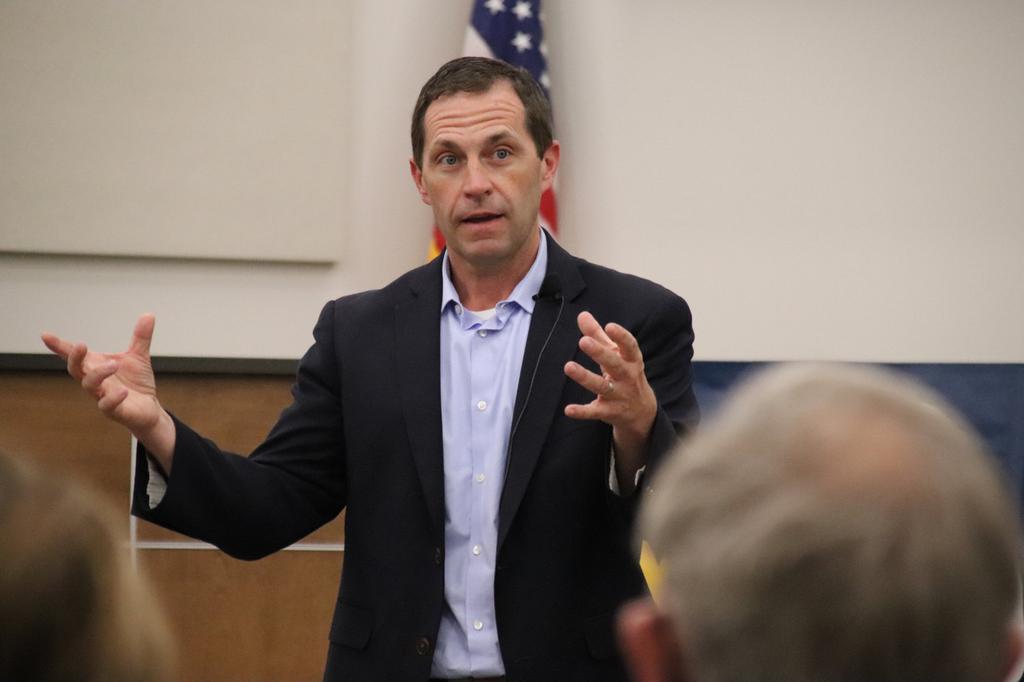Colorado lawmakers talk healthcare reforms in new climate, health and tax bill

After more than a year of trying to muscle through one of the most ambitious spending bills in Congress in decades, Colorado Democratic Congressmen Jason Crow, of the 6th District, and Joe Neguse, of the 2nd District, touted their legislative accomplishments during a virtual town hall Sept. 6.
The Inflation Reduction Act — or IRA — which congressional Democrats passed last month over unified Republican opposition, marks the largest spending in climate change initiatives in U.S. history and allocates billions for subsidized health insurance and deficit reduction.
It aims to raise new revenue — roughly $740 billion — over the next 10 years by saving money on prescription drug costs, implementing a new 15% minimum corporate tax, increasing tax enforcement and imposing a 1% excise tax on stock buybacks.
Crow said the law is “better than paid for” as it “reduces the deficit by creating a more fair and equitable tax system.” Hailing it as “a transformational legislative win” Crow and Neguse said the IRA’s healthcare benefits would lessen financial burdens for thousands of their constituents.
Under the law, expanded subsidies for those with health insurance through the Affordable Care Act — or ACA — will continue for the next three years, which Crow estimates will mean thousands of dollars in savings for the roughly 16,000 people with ACA insurance who live in his district, which includes Littleton, Englewood and Centennial.
Those subsidies, first enacted by congressional Democrats under the American Rescue Plan Act in March 2021, were set to expire at the end of this year. Without the new funding in the IRA, healthcare premiums could have risen by more than 50%, Crow said.
The IRA will also cap out-of-pocket prescription drug costs for Medicare recipients at $2,000 per year — with a $35 monthly cap on insulin — and drug manufacturers will be penalized for increasing prices faster than inflation.
Crow estimates about 5,400 people living in his district get insulin through Medicare and said the new reforms will mean savings upwards of $1,300 per year for recipients.
“These are major savings, it’s going to make a big difference,” he said, though the drug caps won’t begin until 2026 — the year when Medicare will begin negotiating the price of some prescription drugs.
Neguse, whose district includes Boulder and Fort Collins, said the IRA comes at a time when “so many Coloradans have been forced to choose between paying for their groceries or medical bills” because of “sky high” healthcare costs.
Rebecca Gillet, a Centennial resident, said the IRA is a “huge step in the right direction” for healthcare reform. Having lived with rheumatoid arthritis for more than 20 years, Gillet said she knows how price can keep someone from accessing “life-saving drugs.”
“Having access and affordability to medications that can improve our daily lives is so important,” Gillet said, adding “no one should have to let their health suffer” because of high costs.
Listeners asked Crow and Neguse if the drug caps could go even further and extend to private insurance in future legislation.
Democrats had tried to pass a $35 monthly cap for commercial insulin during the IRA’s passage in the Senate last month, but Republicans were successful in stripping that provision from the final bill, though the Medicare cap remained in place.
Crow said he is still hopeful that future caps on commercial drugs would be possible.
“(The IRA) is really a template for future expansion of that type of an approach,” Crow said. “It’s going to show, it’s going to illustrate … that it works and we should be able to expand that in the future beyond Medicare.”
The law’s passage caps a tumultuous year-long effort by Democrats in Congress to pass key aspects of President Joe Biden’s domestic agenda. Initially envisioned as a $3.5 trillion package over 10 years called the Build Back Better Act — which had been likened to social policy spending on the scale of the New Deal of the 1930s — the proposal was significantly cut down to appease moderate Democrats whose votes were crucial.
Plans for universal preschool and community college, subsidized child care, paid leave, affordable housing and more were jettisoned. For months the bill seemed dead after it could not gain support from Sen. Joe Manchin (D-WV). But in a surprise last-minute deal with the senator in July, it was resurrected, renamed and passed along party lines before being signed into law by Biden Aug. 16.
Despite the shortcomings of its original vision, the IRA stands as a landmark climate law and the most significant federal health care reform in more than a decade.
“It’s a tremendous win, in my view, for the American people,” Neguse said.
Published on ColoradoCommunityMedia.com.
